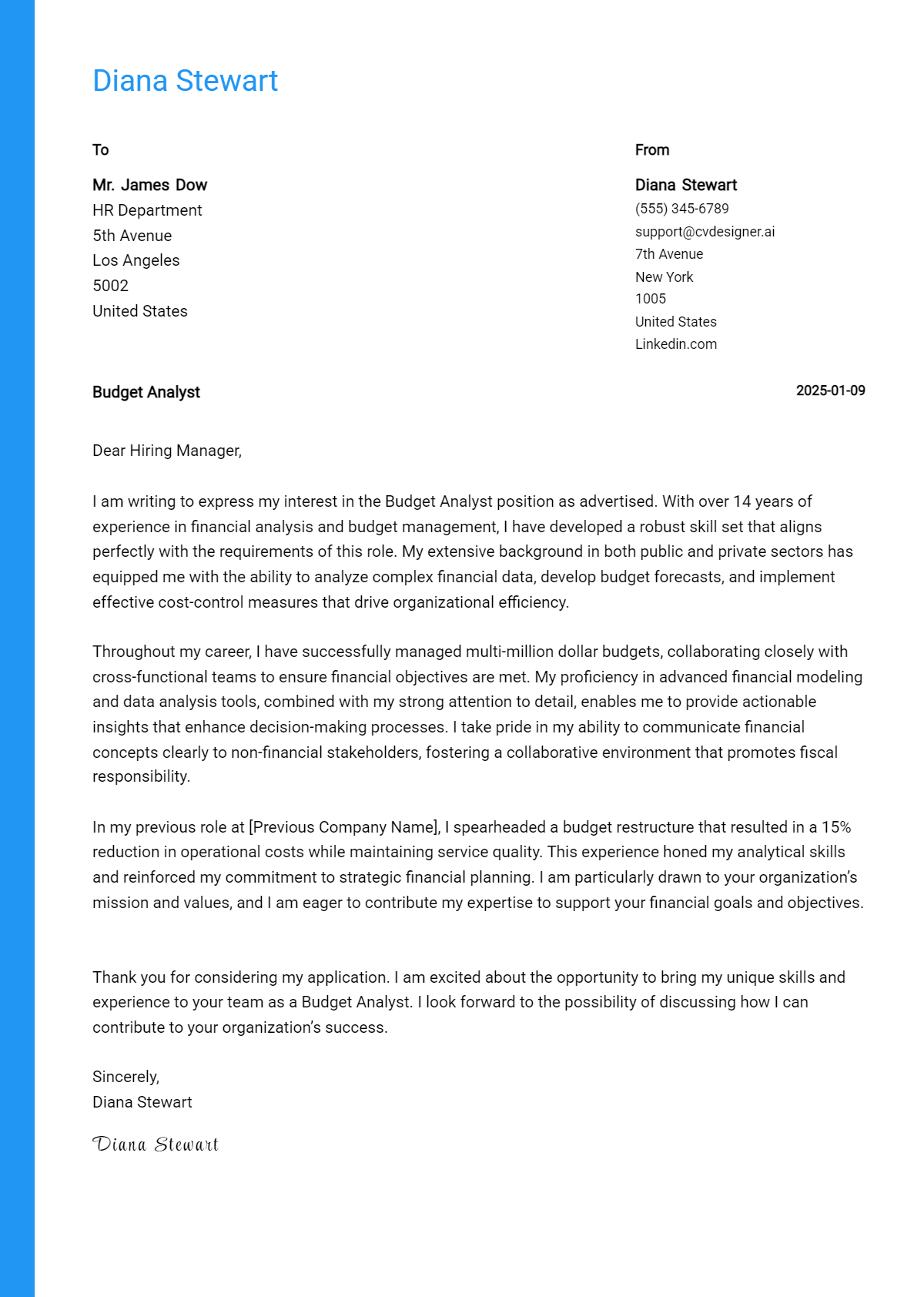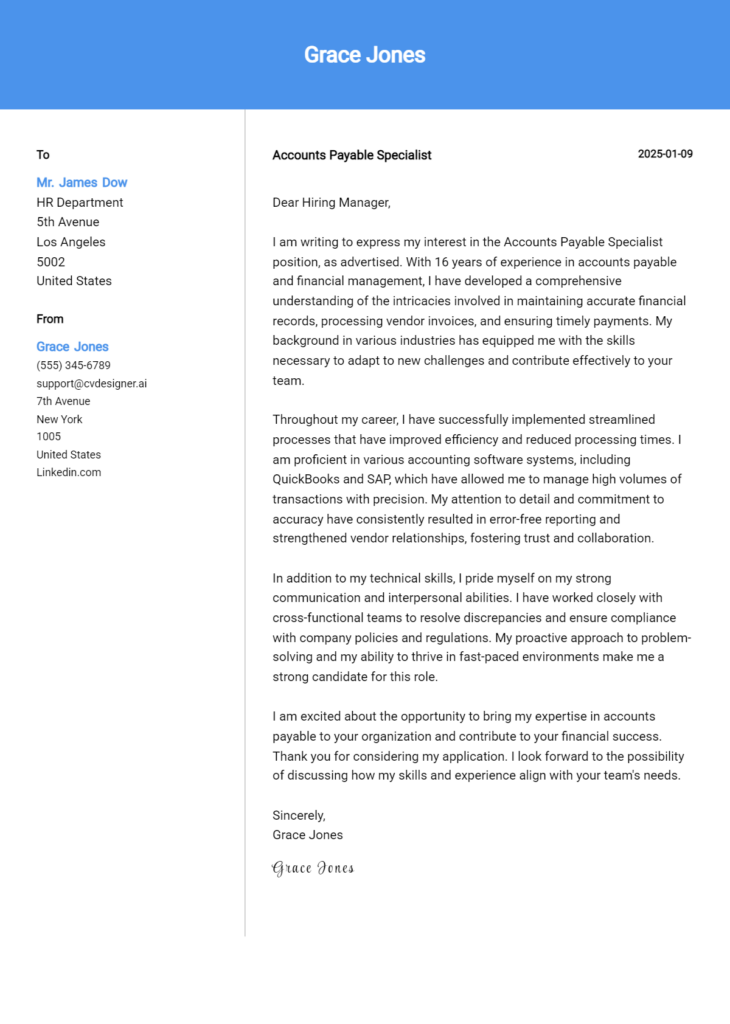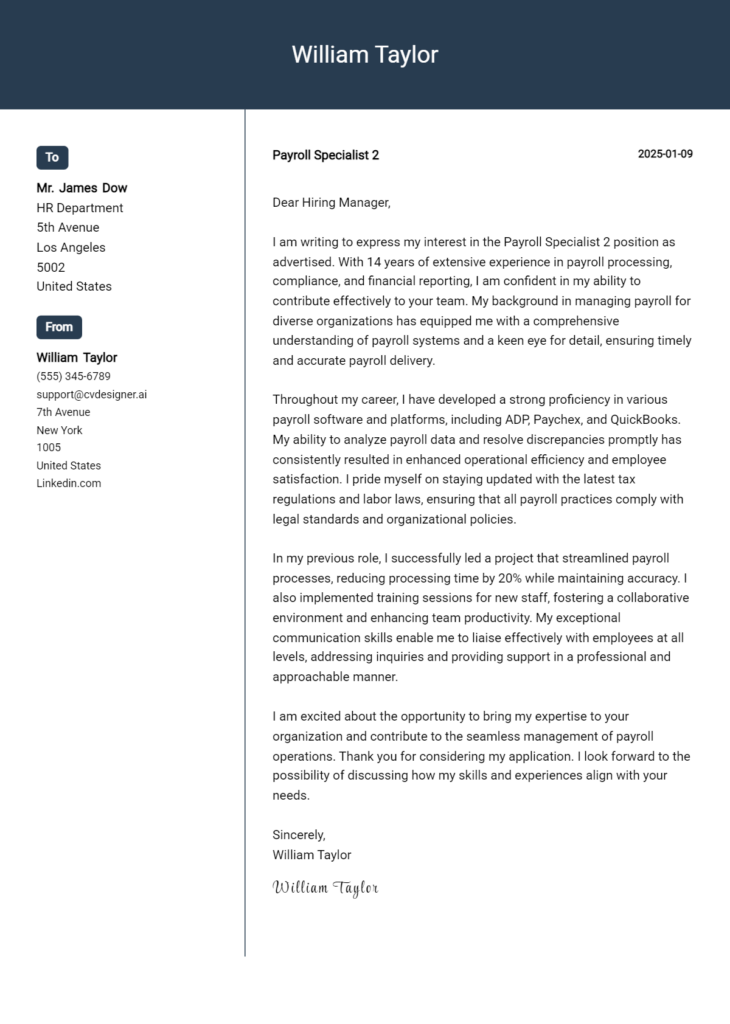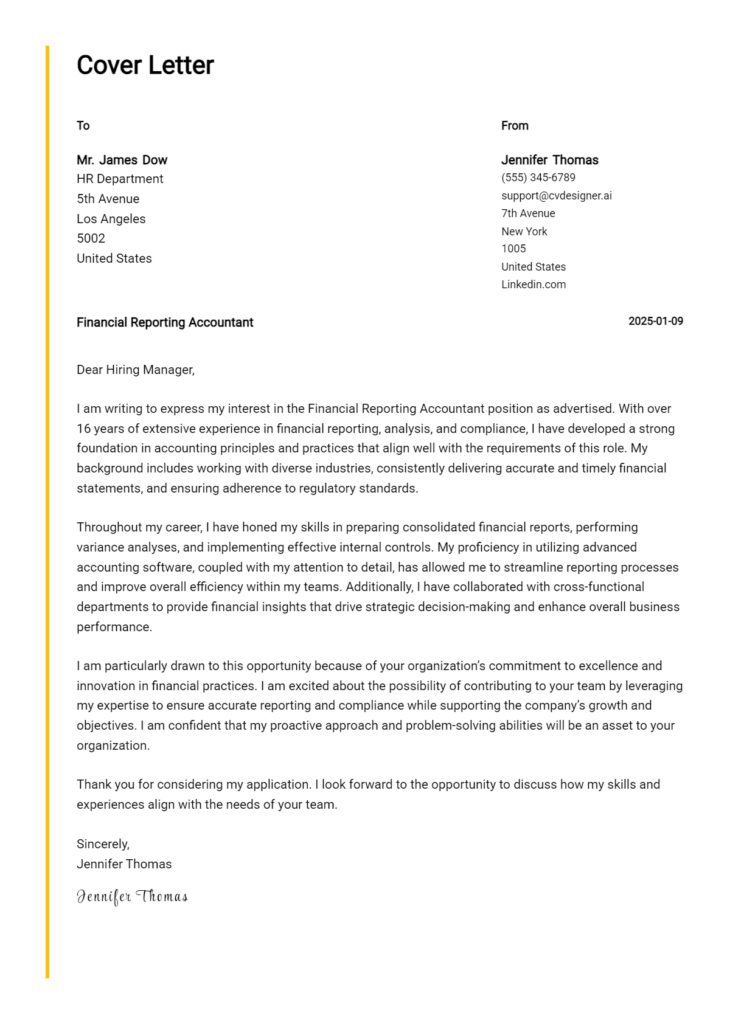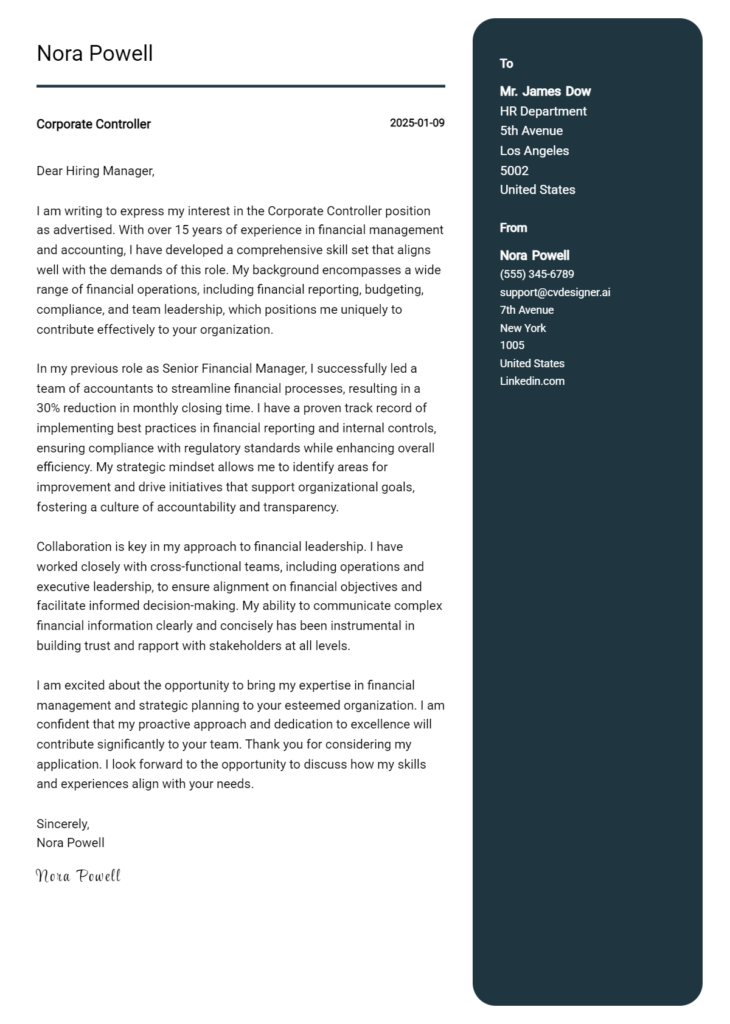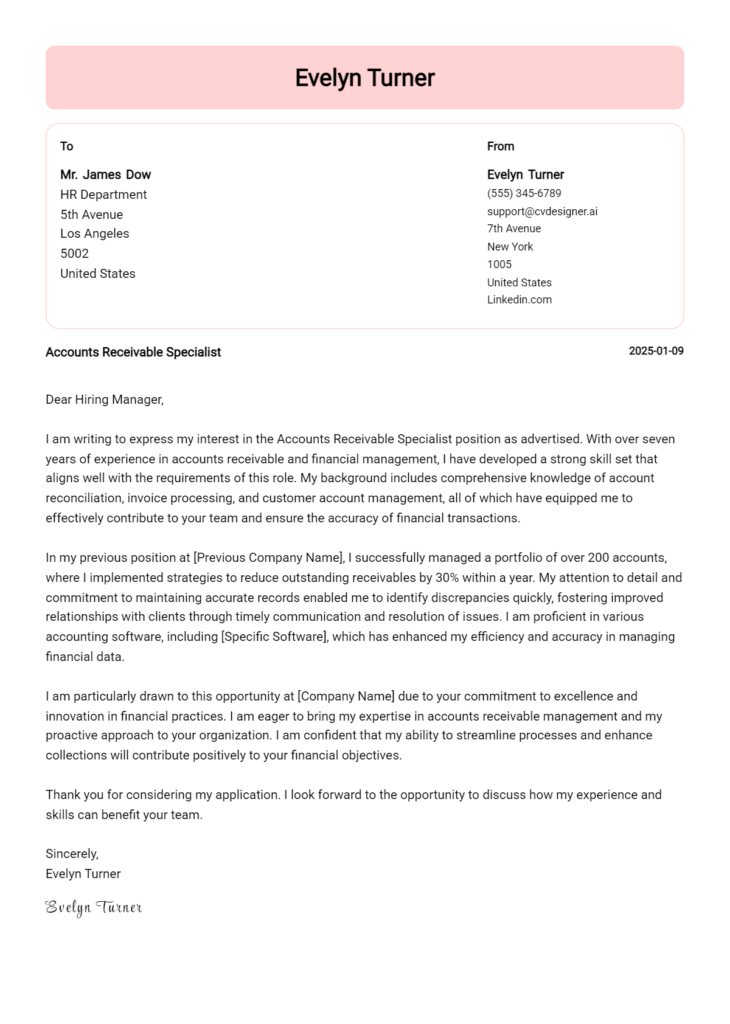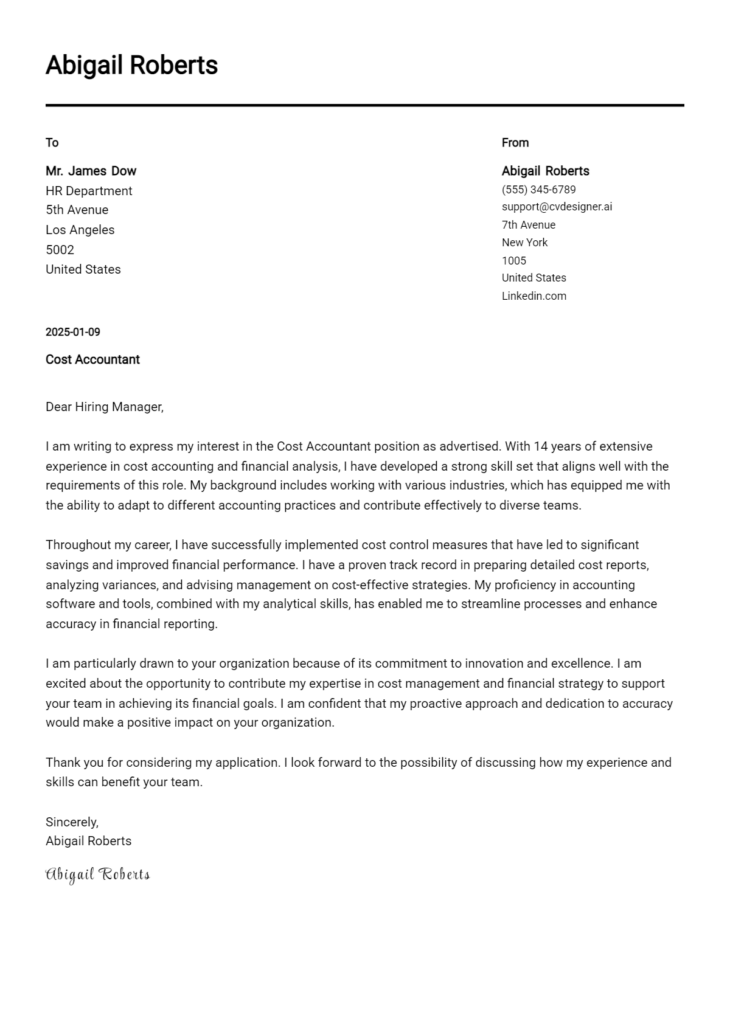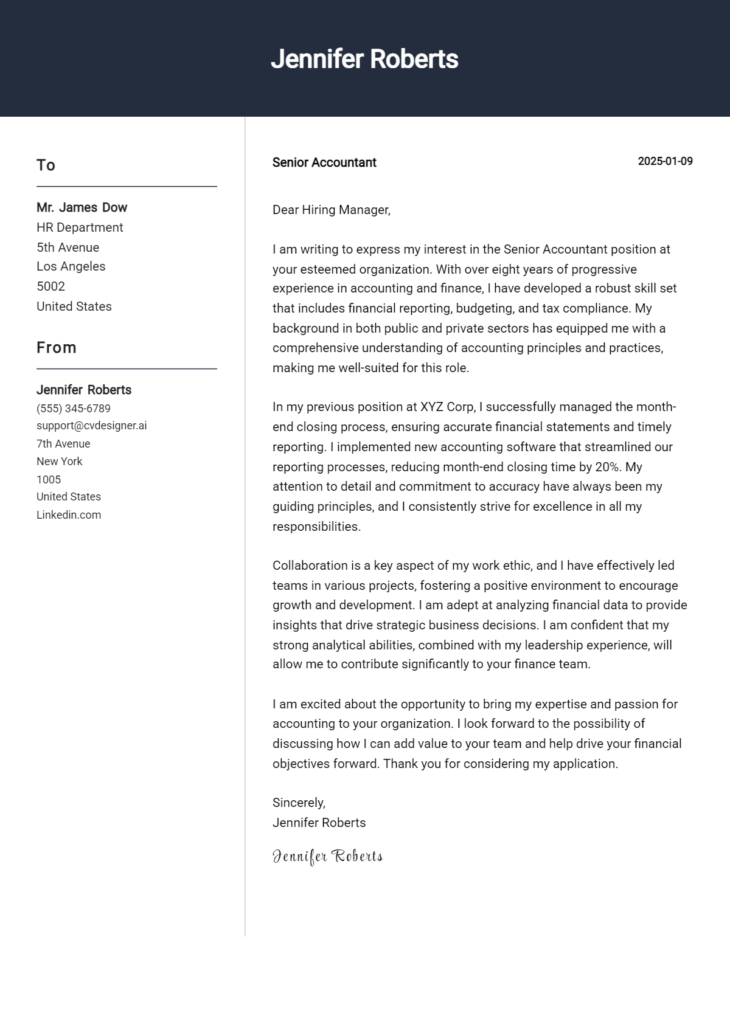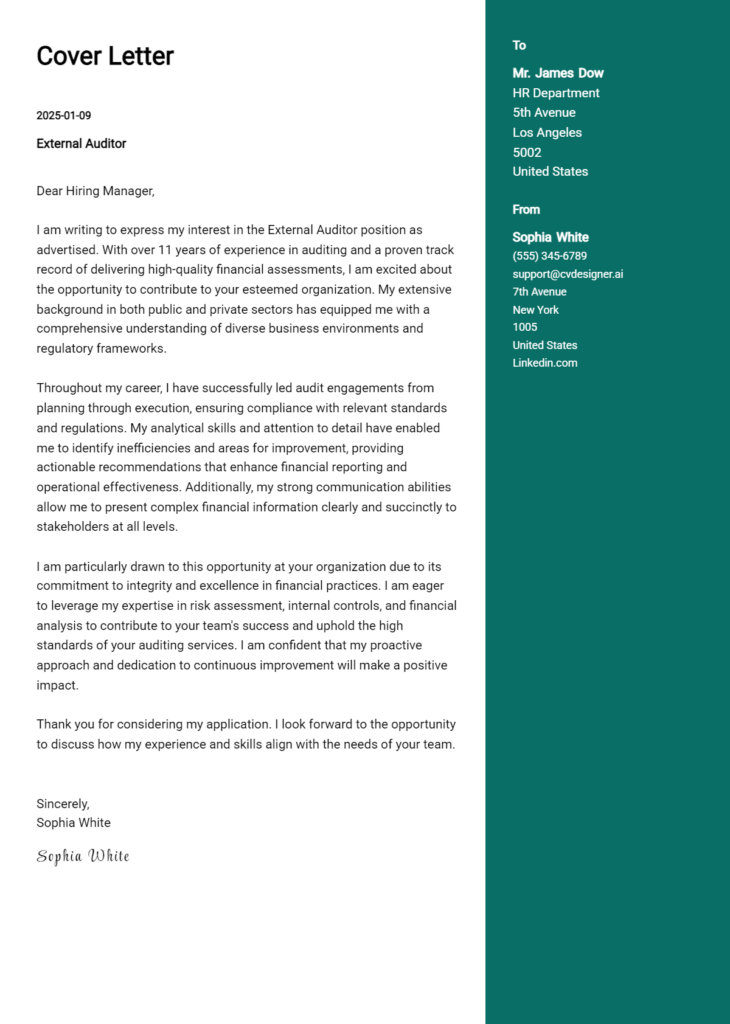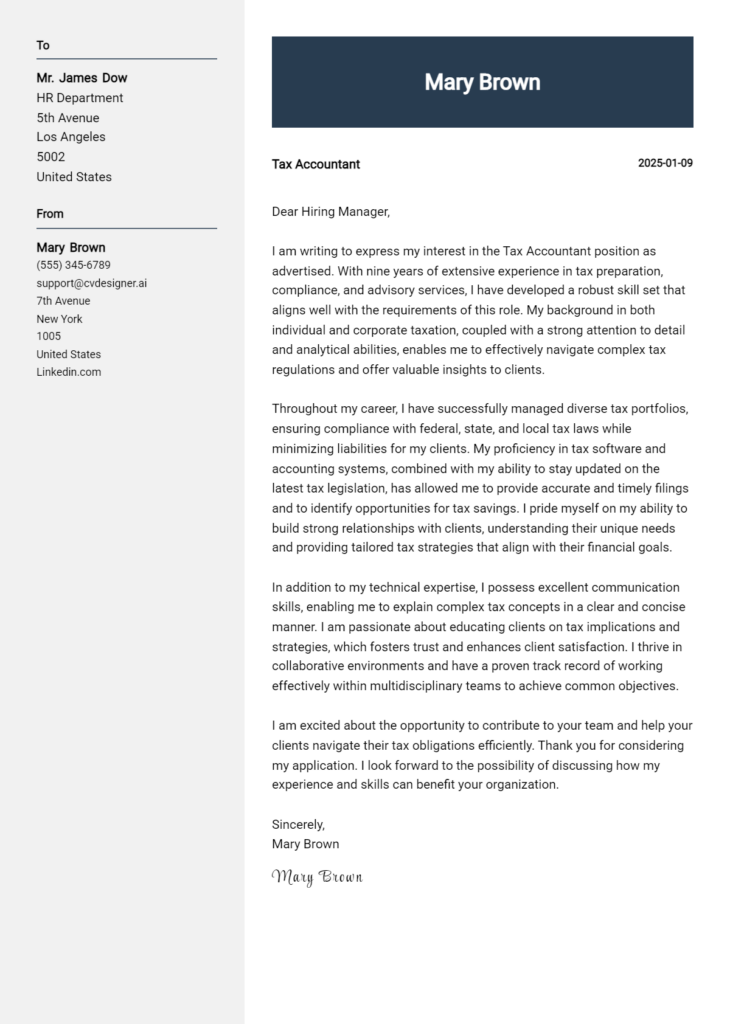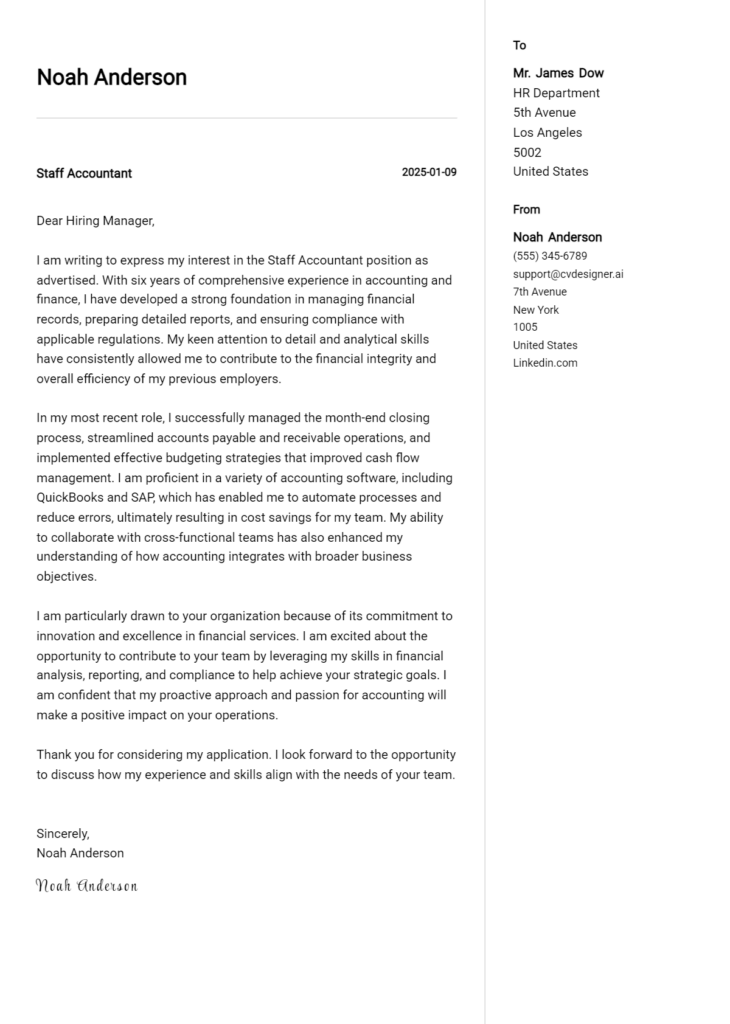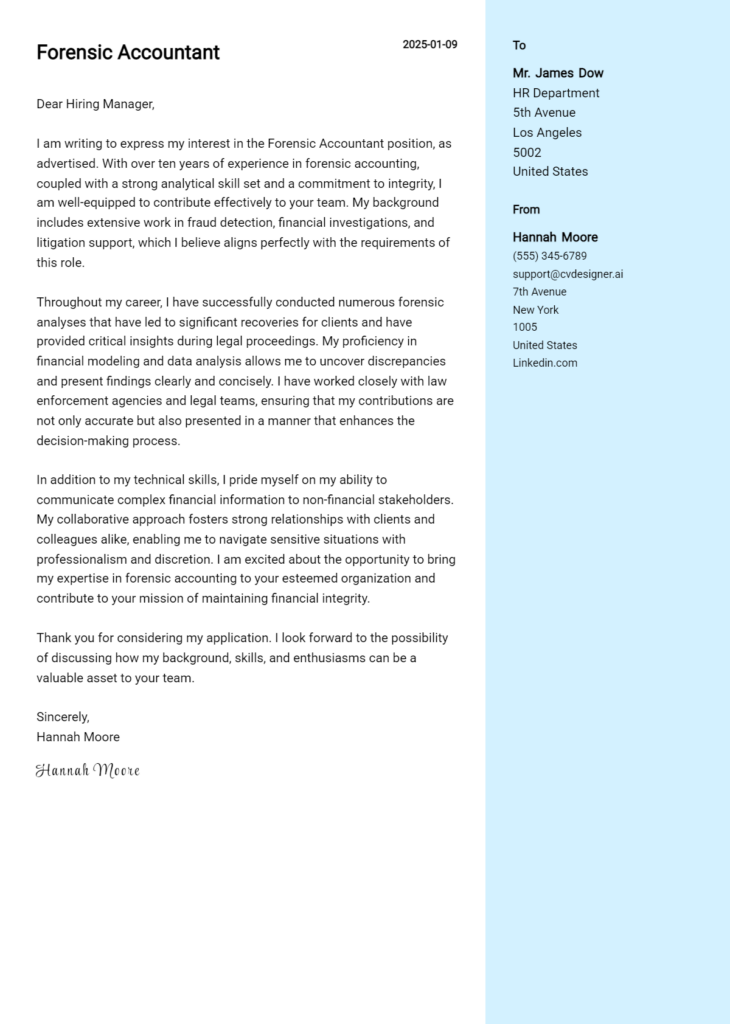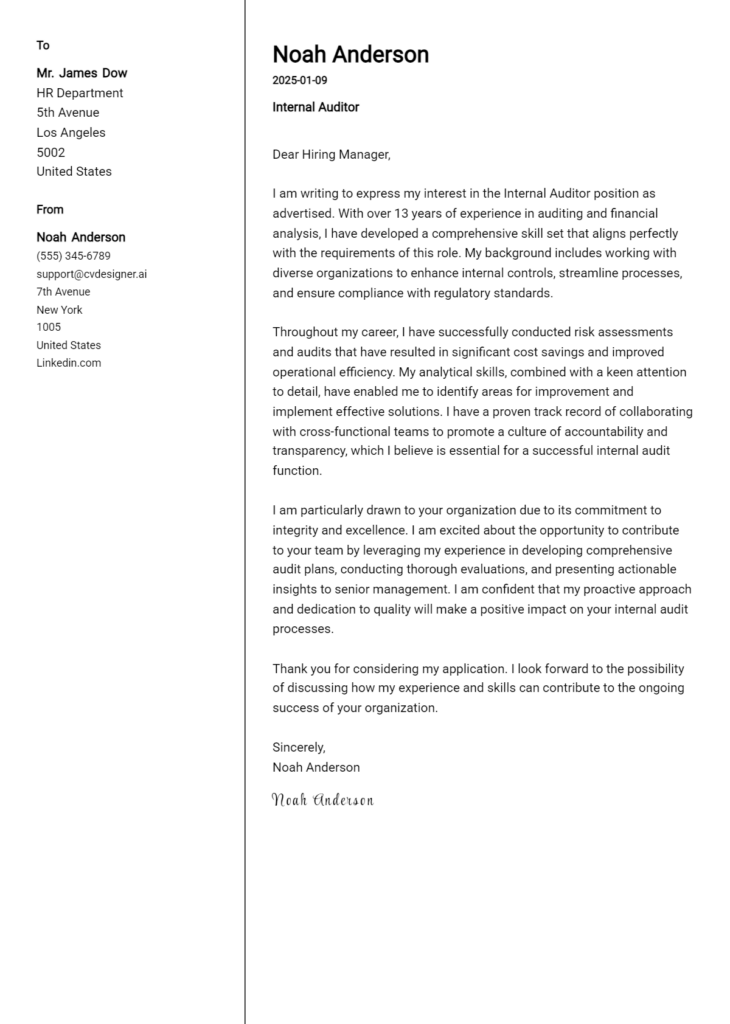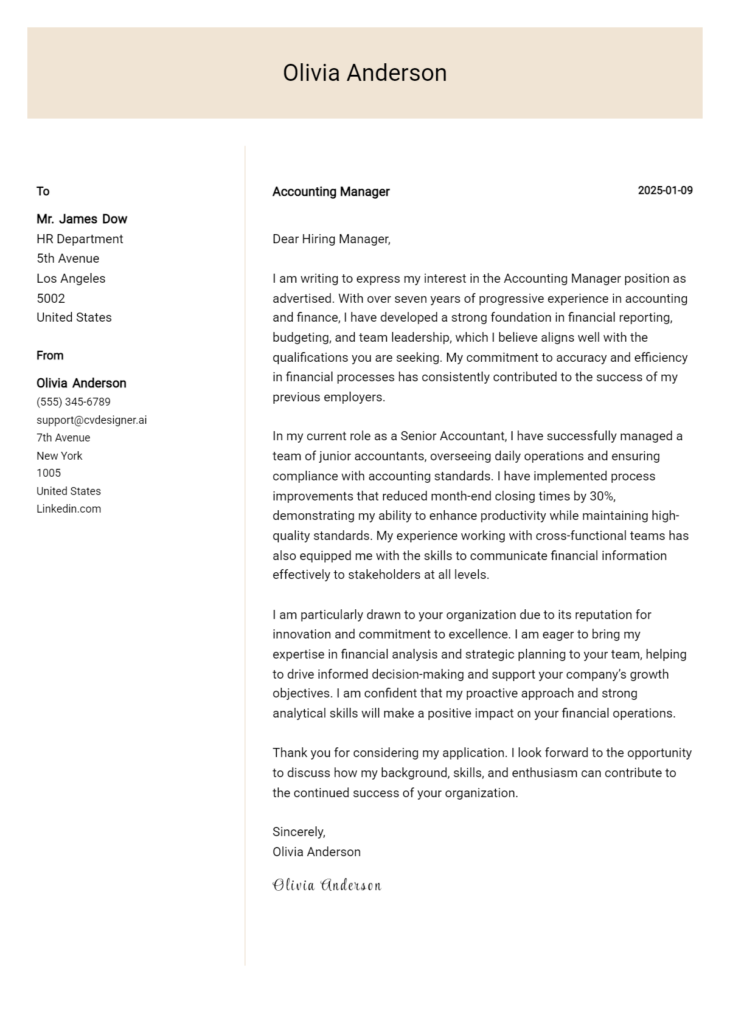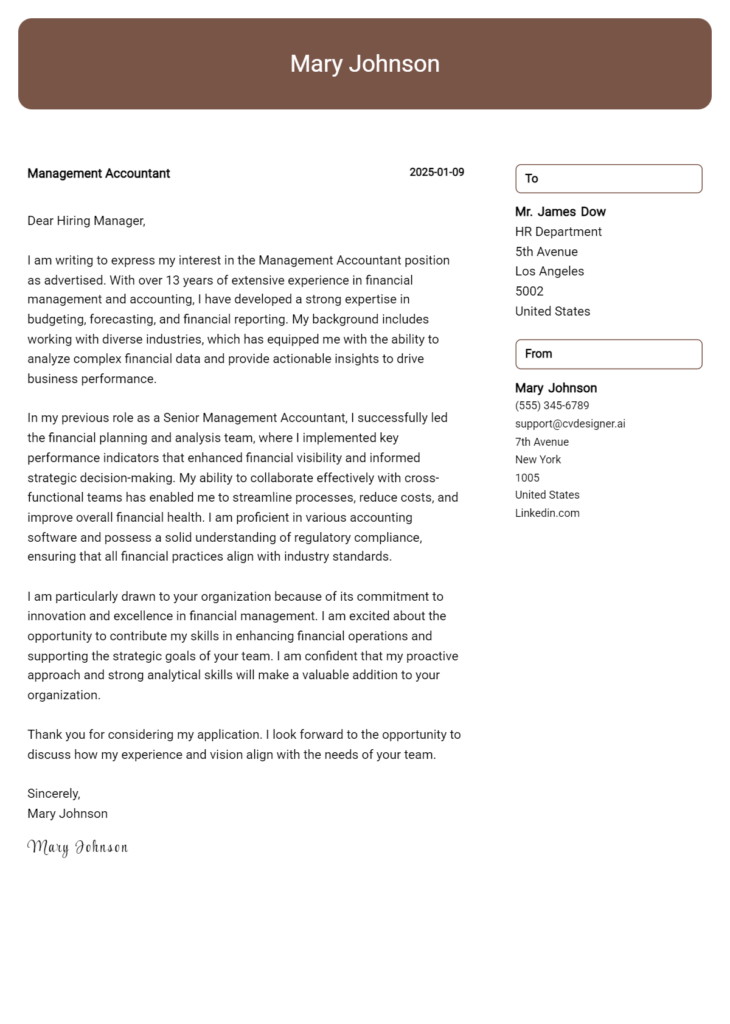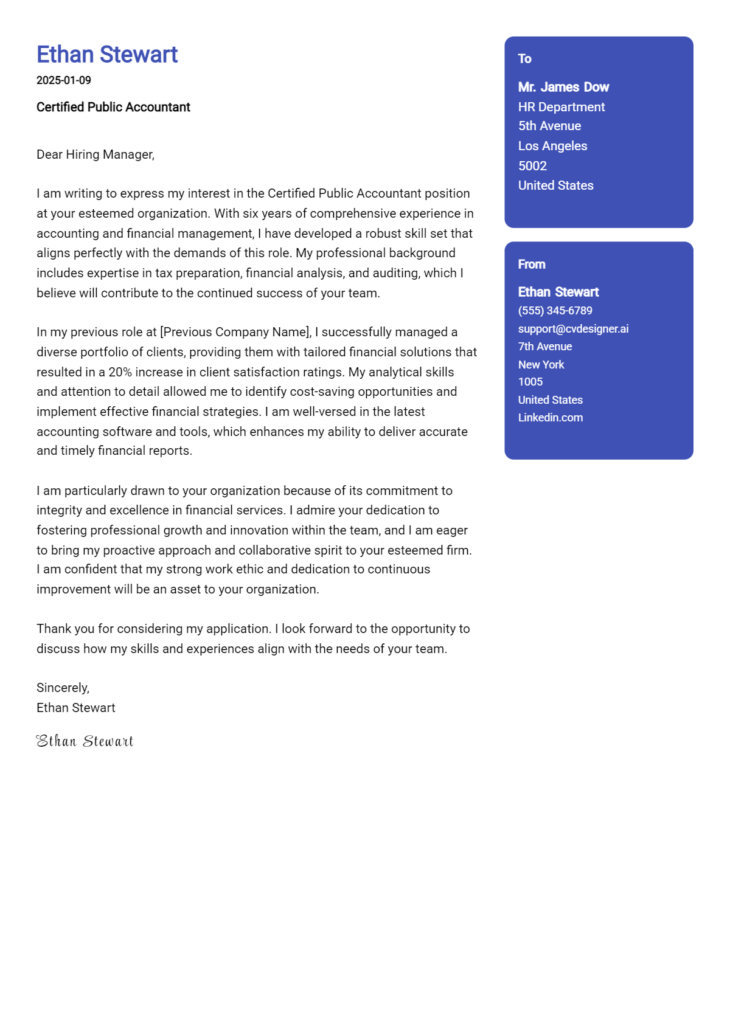Budget Analyst Cover Letter Examples
Explore additional Budget Analyst cover letter samples and guides and see what works for your level of experience or role.
How to Format a Budget Analyst Cover Letter?
Crafting a compelling cover letter is essential for a Budget Analyst, as it serves as your first opportunity to demonstrate your analytical abilities and financial acumen. The way you format your cover letter not only reflects your professionalism but also showcases your attention to detail—critical traits for anyone in the budgeting field. A well-organized cover letter can effectively highlight your qualifications, making it easier for hiring managers to see how you can contribute to their financial goals.
In this guide, we’ll outline the key components of a successful budget analyst cover letter, including:
- Cover Letter Header
- Cover Letter Greeting
- Cover Letter Introduction
- Cover Letter Body
- Cover Letter Closing
Each section is vital for effectively communicating your skills and experiences. Let’s delve into each part to ensure your cover letter stands out in a competitive job market.
Importance of the Cover Letter Header for a Budget Analyst
A well-structured cover letter header is crucial for a Budget Analyst as it sets the tone for professionalism and clarity right from the start. The header should include your contact information, the date, and the recipient's details to ensure that your application is easily identifiable and formally presented. This information not only helps in organizing the correspondence but also conveys respect for the recipient's time and position. A clear and professional header reflects your attention to detail, which is a vital attribute for a Budget Analyst tasked with managing financial data.
Strong Example:
John Smith 123 Finance Ave Cityville, ST 12345 john.smith@email.com (123) 456-7890 October 1, 2023 Ms. Jane Doe Hiring Manager Finance Department Company XYZ 456 Business Rd Townsville, ST 54321
Weak Example:
John Cityville john@email.com 10/1/23 Hey, Finance Department Company XYZ
The Importance of a Cover Letter Greeting for a Budget Analyst
The greeting of a cover letter is not merely a formality; it serves as the first impression a hiring manager will have of you. A well-crafted greeting sets the tone for the entire letter, conveying professionalism and respect while also personalizing your application. By addressing the hiring manager by name, you demonstrate initiative and attention to detail, which are crucial qualities for a Budget Analyst who must navigate complex financial data and reporting structures. To avoid sounding generic, take the time to research the recipient's name and title when possible. This small effort can significantly enhance your connection with the reader and increase the likelihood of your application being positively received.
Strong Greeting Example
Dear Ms. Johnson,
Weak Greeting Example
To Whom It May Concern,
Importance of a Well-Crafted Cover Letter Introduction for a Budget Analyst
A well-crafted cover letter introduction is crucial for a Budget Analyst application as it serves as the first impression on the hiring manager. This section should not only capture attention but also convey genuine interest in the role while highlighting relevant skills or achievements that align with the job requirements. A strong introduction sets the tone for the rest of the letter, encouraging the reader to delve deeper into the candidate's qualifications.
To illustrate the difference between effective and ineffective introductions, consider the following examples:
Strong Example
Dear [Hiring Manager's Name], I am excited to apply for the Budget Analyst position at [Company Name] as advertised on [Job Board/Company Website]. With over five years of experience in financial analysis and a proven track record of optimizing budgets to enhance organizational efficiency, I am eager to contribute my expertise to your team. My recent success in reducing departmental expenditures by 15% while maintaining quality service underscores my commitment to strategic financial management.
Weak Example
To Whom It May Concern, I am writing to apply for the Budget Analyst job. I have some experience in budgeting and think I could do the job. I also like working with numbers, which I guess is important for this role.
Purpose of the Cover Letter Body for a Budget Analyst
The cover letter body for a Budget Analyst serves as a crucial platform for candidates to effectively communicate their qualifications, relevant experiences, and the unique value they bring to the organization. This section allows candidates to elaborate on specific projects or accomplishments that align with the job role, demonstrating their analytical skills, attention to detail, and ability to manage financial resources effectively. By showcasing their achievements, such as successful budget forecasting, cost-saving initiatives, or data analysis projects, applicants can illustrate their potential contributions to the company's financial health and strategic goals.
Strong Example
I am excited to apply for the Budget Analyst position at XYZ Corporation. In my previous role at ABC Inc., I led a project that involved revamping our annual budgeting process, which resulted in a 15% reduction in costs while maintaining service quality. My ability to analyze spending trends and make data-driven recommendations helped the company save over $200,000 in the fiscal year. Additionally, my experience in using advanced financial modeling techniques allowed me to create dynamic budget forecasts that improved our accuracy by 20%. I am eager to bring my strong analytical skills and proven track record of optimizing budgets to your team.
Weak Example
I would like to apply for the Budget Analyst job. I have some experience in budgeting and think I would be a good fit. In my last job, I worked on budgets but didn't really accomplish much. I know how to use Excel and can follow instructions. I am looking forward to working in a company like yours.
Importance of the Cover Letter Closing for a Budget Analyst
The closing paragraph of a cover letter is crucial for leaving a lasting impression on potential employers. For a Budget Analyst, it should succinctly summarize your qualifications, reiterate your enthusiasm for the role, and encourage the hiring manager to take the next steps, such as reviewing your resume or scheduling an interview. A strong closing can reinforce your fit for the position and demonstrate your proactive attitude, while a weak closing may leave the reader uncertain about your interest or qualifications.
Strong Example
Thank you for considering my application for the Budget Analyst position. With my strong analytical skills and extensive experience in financial planning, I am eager to contribute to your team at [Company Name]. I am particularly excited about the opportunity to support your financial strategies and ensure optimal resource allocation. I look forward to the possibility of discussing my qualifications further and am hopeful we can schedule an interview at your convenience. Please feel free to contact me at your earliest convenience.
Weak Example
I hope you read my resume. I think I would be a good fit. Please get back to me if you want to talk.
These tips will help candidates craft an effective cover letter for a Budget Analyst position, emphasizing the importance of showcasing relevant technical skills, problem-solving abilities, knowledge of the Software Development Life Cycle (SDLC), teamwork, and a passion for continuous learning. A well-crafted cover letter can set you apart from other candidates by highlighting your unique qualifications and enthusiasm for the role.
Cover Letter Writing Tips for Budget Analyst
Highlight Technical Skills: Budget Analysts must be proficient in financial analysis tools and software. Ensure that your cover letter mentions specific tools you are familiar with, such as Excel, SAP, or Oracle. Use examples to demonstrate how you have successfully utilized these tools in previous positions. This not only shows your technical capability but also your readiness to tackle the responsibilities of the role.
Showcase Problem-Solving Abilities: Employers value candidates who can analyze complex financial data and provide actionable insights. Include a brief story or example in your cover letter that illustrates a problem you faced in your previous work and how you resolved it. This will highlight your analytical thinking and ability to contribute to the organization’s financial health.
Demonstrate SDLC Knowledge: As a Budget Analyst, understanding the Software Development Life Cycle can be crucial, especially if you work in tech-related industries. In your cover letter, mention any experience you have with budgeting for software projects, understanding development costs, or collaborating with IT teams. This will show your versatility and ability to bridge finance and technology.
Emphasize Teamwork: Collaboration is key in any financial role. Use your cover letter to discuss experiences where you worked as part of a team to achieve budgeting goals or improve financial processes. Highlight your communication skills and how you contributed to a positive team dynamic. This not only shows that you can work well with others but also that you value cooperative efforts in achieving financial success.
Express Passion for Continuous Learning: The field of finance is always evolving, and a commitment to lifelong learning is essential. Mention any relevant certifications, courses, or professional development activities you have undertaken to stay current in your field. This will demonstrate your proactive approach to personal and professional growth, making you a more attractive candidate.
By incorporating these elements into your cover letter, you can create a compelling narrative that showcases your qualifications as a Budget Analyst. For additional resources, consider exploring cover letter templates or using a cover letter builder to enhance your application materials.
Common Mistakes to Avoid in a Budget Analyst Cover Letter
Crafting a compelling cover letter is essential for standing out in the competitive field of budget analysis. Avoiding common mistakes can significantly improve your chances of landing an interview. Here are some pitfalls to steer clear of when writing your cover letter:
Generic Greetings: Using "To Whom It May Concern" can come off as impersonal. Always try to find the hiring manager's name for a more tailored approach.
Lack of Specific Examples: Failing to provide concrete examples of your budgeting experience can weaken your application. Use specific metrics or projects to demonstrate your impact.
Overly Formal Language: While professionalism is key, overly complex language can make your letter hard to read. Aim for a clear and concise style that reflects your personality.
Ignoring Job Description: Neglecting to align your skills with the job description can make it seem like you haven't done your homework. Carefully read the job posting and address how your qualifications meet their needs.
Typos and Errors: Spelling and grammatical mistakes can undermine your credibility. Always proofread your letter or use tools to ensure it's error-free.
Failing to Show Enthusiasm: A lack of enthusiasm can be a red flag. Express genuine interest in the position and the company to make a positive impression.
Formatting Issues: Poor formatting can distract from your message. Ensure your cover letter follows a professional cover letter format that enhances readability and organization.
For inspiration, check out cover letter examples that showcase effective strategies to present your qualifications confidently. By avoiding these common mistakes, you can create a strong cover letter that enhances your candidacy as a budget analyst.
Cover Letter FAQs for Budget Analyst
What should I include in my cover letter for a Budget Analyst position?
In your cover letter, highlight your analytical skills, attention to detail, and experience with financial modeling and budgeting processes. Start with a strong introduction that specifies the position you’re applying for and briefly explain your interest in the role. Discuss relevant experiences, such as working with financial reports or managing budgets, and incorporate specific examples that showcase your problem-solving abilities. Additionally, mention any software proficiency (e.g., Excel, SAP) and certifications (e.g., CPA, CFA) that enhance your qualifications. Conclude with a strong closing statement expressing enthusiasm for the opportunity and a willingness to discuss your application further.
How can I demonstrate my analytical skills in a cover letter?
To effectively demonstrate your analytical skills, incorporate concrete examples from your previous roles that illustrate your ability to analyze data and make informed decisions. Describe a specific project where you identified budget discrepancies and implemented solutions that resulted in cost savings or improved efficiency. Use metrics to quantify your contributions, such as “reduced departmental spending by 15% through detailed variance analysis.” Additionally, mention any tools or methodologies you employed, like forecasting techniques or data visualization software, to present findings. This will reinforce your analytical capabilities and show potential employers your value as a Budget Analyst.
Should I tailor my cover letter for each job application?
Yes, tailoring your cover letter for each job application is essential. A customized cover letter allows you to align your skills and experiences with the specific requirements of the Budget Analyst position you’re applying for. Start by reviewing the job description and identifying key responsibilities and qualifications. Highlight how your background meets these needs, and include relevant examples that relate directly to the job. By personalizing your cover letter, you demonstrate genuine interest in the position and increase your chances of standing out among other candidates, making a stronger case for why you are the best fit for the role.
How long should my cover letter be for a Budget Analyst position?
Your cover letter should typically be one page long, consisting of three to four paragraphs. Aim for around 250 to 400 words to ensure you provide enough detail without overwhelming the reader. Begin with a brief introduction, followed by a paragraph discussing your relevant experience and skills, and another paragraph that highlights specific accomplishments. Use the final paragraph to express your enthusiasm for the role and your desire for an interview. Keeping your cover letter concise and focused allows hiring managers to quickly grasp your qualifications and interests, making it more likely that they will consider you for the position.
Build your Cover Letter in minutes
Use an AI-powered cover letter builder and have your letter done in 5 minutes. Just select your template and our software will guide you through the process.

